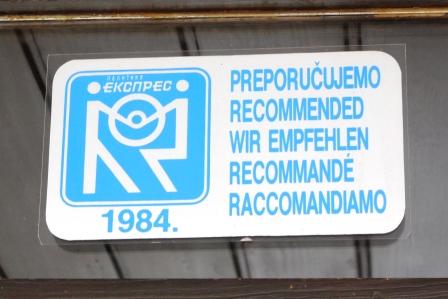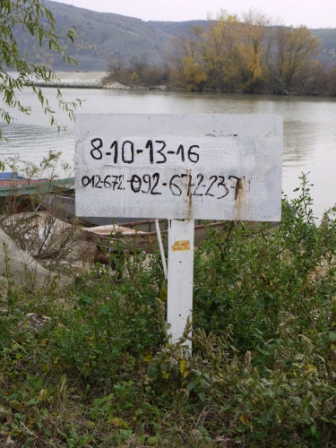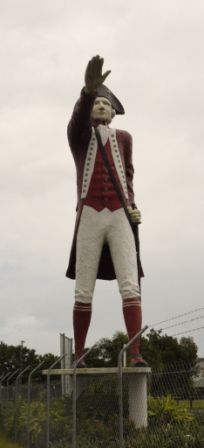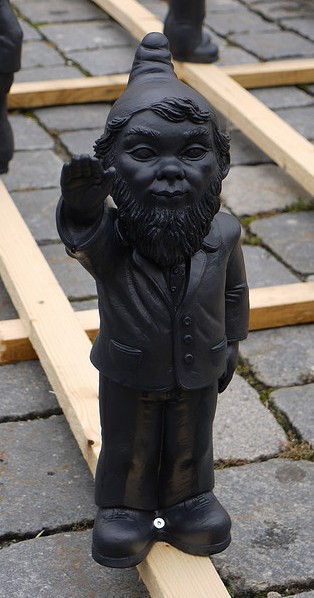
It was the best hotel in town. Came recommended. In 1984. The place looked tired, the decor dated. The cistern dripped slowly onto the bathroom floor, but the sheets on the bed were pristine, the towels clean and the shower hot. And there was the familiar Serbian warm welcome. Even space for Emma in a discrete corner of the foyer. It was quiet, just a few rooms let that evening.
I’d arrived in the small town of Golubac shortly before four, by now almost dark, glad to rest up for the night after an eventful day. I’d left the small town of Kovin just after nine, allowing myself four hours to cover the sixty or so kilometres to the ferry at Stara Palanka. Miss the sailing at one and the next wasn’t for three hours, too late to reach Golubac.
Still no sign – literally – for the Danube cycle way, so, just as for the previous day, I simply followed my own road map. Gently undulating now, enough to break the monotony but without unduly impeding progress. If there was a potential impediment to reaching the ferry on time, it lay not with the terrain, but dogs. They’d been a familiar sight at many of the properties I’d passed since entering Hungary, but, with the odd exception, had been contained behind tall wire fencing. A noisy distraction rather than a threat. But today was different. They roamed free across the countryside, wild, often in small packs.
The problem is simple. Rabies. A disease, I’m told, quite prevalent in Serbia. Carriers can be extremely aggressive. Saliva from an infected creature into a scratch can be sufficient to pass on the virus. I’m inoculated, but all that does is buy me time. I still need more serum. Makes you think. Which is what I did.
Stop only in villages or open countryside where I can see anything approach from a good distance, especially from downwind. I’d noticed the odd local cycling, slowly. So, in the event of a likely encounter, consider dropping speed so not to appear as prey. Flight. If that doesn’t work, stop and use the bike as a shield. Fight. We’re not talking about family pets, rather I presume they’re carrying a life-threatening disease and will act accordingly. No plans to blink. I’m told rocks are very effective.

Stara Palanka, shortly before noon, was understandably welcome. As yet no sight of the ferry, but a small wooden sign seemed to confirm what I thought were the sailing times. There was a small cafe bar near the slipway. I ventured in. Deserted but for a man sat at an old computer playing some sort of ’shoot-them-up’ game. The owner I thought. Didn’t like to be disturbed, instead summoning his wife from the kitchen. She smiled. I ordered coffee and chips.
I picked up the newspaper. Flicked to the television programmes. I’d been rather taken by Serbian TV. For one thing, unlike Hungary, they generally went for subtitles rather than dubbing which opened up a whole world of US dramas. And films. They had some catching up to do. Kalifornia and Point Break were billed for that evening. Early 90s I thought. But best of all is the modern day celebrity reality show Farma – set, literally, on a contrived farm. It’s the regular sing-songs they have I like best. Don’t understand a word, just annoyingly catchy.
Lunch arrived. With a few additions, a basket of bread and several slices of banana cake. Not bad for about a pound. It had taken a while to arrive, but the lady indicated there was no need to rush for the ferry. It’d just arrived and the Captain was enjoying a drink outside. After a while I decided to wander down anyway, a few photographs to be taken. I left the owner still transfixed to his computer. One o’clock, it seemed, was the time you thought about turning up, perhaps dropped off by family or friends. Sailing would be some time later. Closer to one thirty.
We crossed the Danube to the village of Ram, some fifteen minutes away. Couple of hours to make Golubac before dark. A few hills now, but still able to make good time. I was used to the not unpleasant smell of leaves being burnt in piles at the roadside, but the villages I passed through smelt far more enticing, Sunday lunch perhaps. Yet more mud on the roads, rain threatening and the inevitable loss of light shortly. But no dogs roaming. I pressed on quickly to Golubac.



